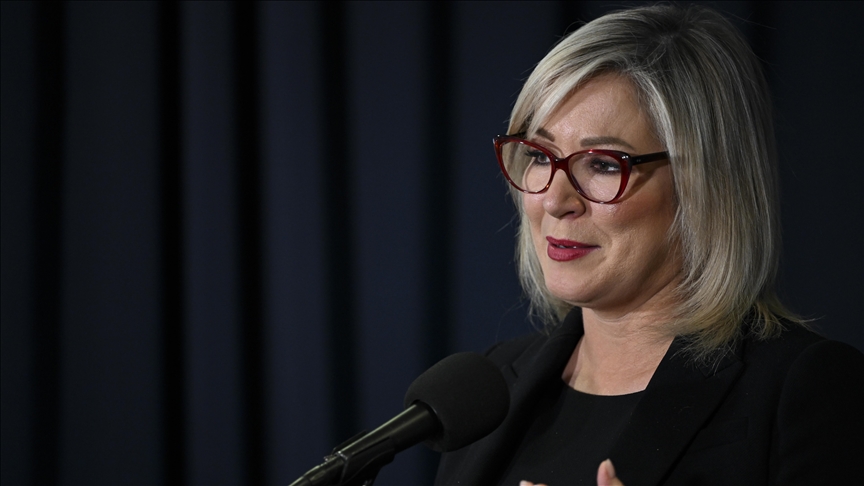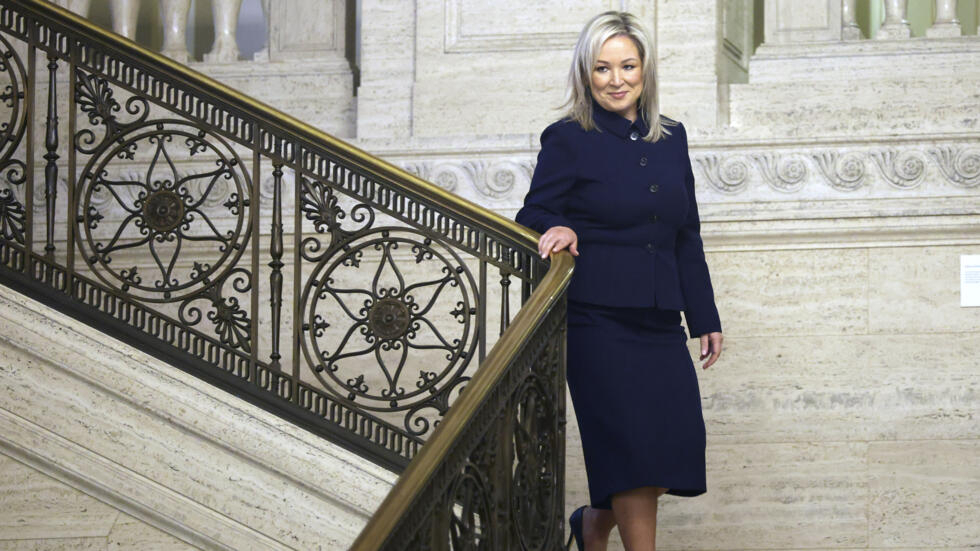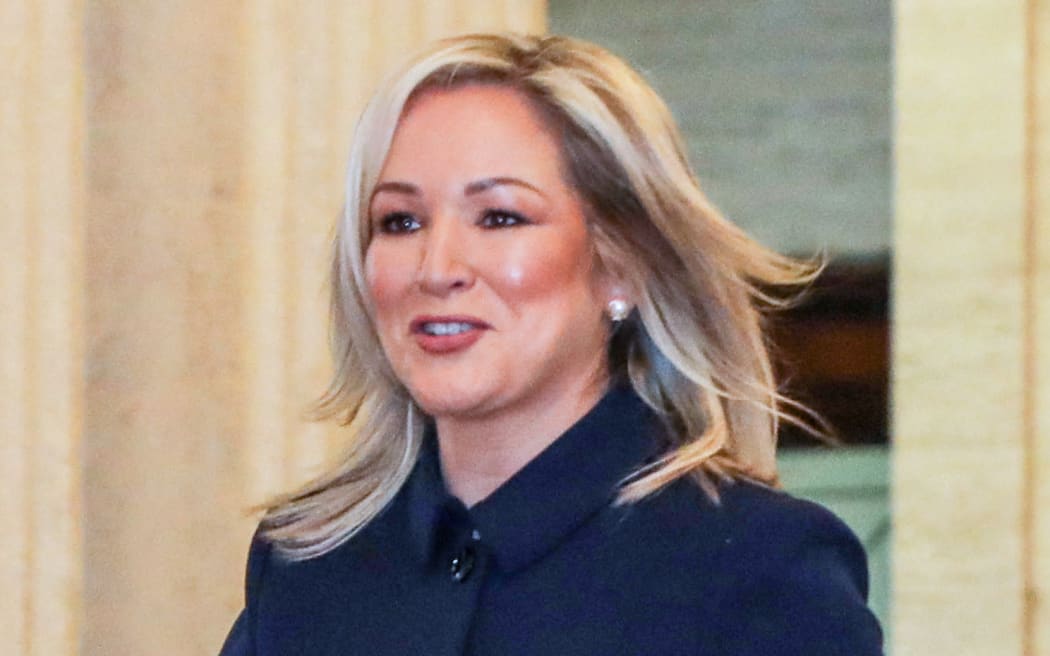ByRob Harris
February 4, 2024 —
London: Michelle O’Neill, from the Sinn Féin party that is committed to Irish reunification, has been elected as first minister of Northern Ireland in a watershed moment which has ended a two-year political standoff in the region.
O’Neill is the first non-unionist politician to head Stormont’s devolved government in the province established more than a century ago by partition as a bastion of pro-UK unionism.

Sinn Féin vice-president Michelle O’Neill speaks after being appointed Northern Ireland’s First Minister, during proceedings of the Northern Ireland Assembly, in Belfast, on Saturday. CREDIT:
The restoration of the power-sharing executive comes two years to the day since the Democratic Unionist Party withdrew from the executive in protest at post-Brexit trading arrangements, plunging the assembly into an impasse.
Pledging to serve all sides equally, O’Neill, the vice-president of the party once considered the IRA’s mouthpiece, said while she was a republican she would be a first minister for all, including “those who cherish the union”.
“For the first time ever, a nationalist takes up the position of first minister. That such a day would ever come would have been unimaginable to my parents and grandparents’ generation,” she said.
O’Neill spoke some words in Irish but described the region both as the “North of Ireland” – the term favoured by her party – and “Northern Ireland”.
“None of us are being asked or expected to surrender who we are,” she said. “The days of second-class citizenship are long gone. Today confirms that they are never coming back. Our allegiances are equally legitimate. Let’s walk this two-way street and meet one another halfway. I will be doing so with both an open hand and with heart.”
O’Neill, 47, won plaudits when she greeted King Charles III warmly after the death of Queen Elizabeth and attended his coronation “to show respect”.
The DUP, Northern Ireland’s largest pro-UK party, came second to Sinn Féin in the region’s elections, held in May 2022, with its MP Emma Little-Pengelly drafted into the post of deputy first minister. The positions have equal legal status with neither able to function without the other.
Gerry Adams, a former Sinn Féin president, was among those in the public gallery for the ceremony and was joined by Fiachra McGuinness, son of the late former deputy first minister Martin McGuinness, who served alongside staunch unionist Ian Paisley following the Good Friday accord, which ended three decades of conflict known as The Troubles.
Both of the women have family links to the region’s troubled past, with O’Neill’s father an IRA prisoner during the conflict involving republican paramilitaries fighting to reunite Ireland, loyalist paramilitaries battling to remain in the UK, and British security forces.
RELATED ARTICLE

Opinion
Political leadership
How Sinn Fein went from ‘pariah’ party to Irish political powerhouse
Ray Bassett
Little-Pengelly’s father was convicted in Paris in 1991 for his role in a loyalist gun-running plot, but has denied having been an arms-buyer.
Despite Sinn Féin’s victory at the 2022 election, a series of opinion polls have since found the people of Northern Ireland would still vote decisively against a united Ireland if there was a referendum, with a survey in The Irish Times last year finding almost twice as many voters who expressed a preference want to remain in the United Kingdom.
The Good Friday Agreement states that the British government should call a referendum if it “appears likely” a majority would want a united Ireland. A concurrent poll must also be held in the Republic of Ireland.
'Such a day would ever come would have been unimaginable to my parents and grandparents' generation,' says O'Neill
Burak Bir |03.02.2024 -

LONDON
Sinn Fein's Michelle O'Neill made history on Saturday after she was appointed as Northern Ireland's first nationalist first minister.
Politicians gathered in Stormont, Northern Ireland's parliament, to appoint a series of ministers to the devolved executive, as a deal was reached for power-sharing after almost two years of political deadlock.
Michelle O'Neill has been appointed Northern Ireland's first minister, while the Democratic Unionist Party's (DUP) Emma Little-Pengelly will serve as deputy first minister.
This came after the DUP ended its boycott of Stormont after agreeing a new deal with the British government on post-Brexit trade rules.
In her first address as the first minister in parliament, O'Neill said that today “opens the door” to a shared future.
"This is an assembly for all Catholic, Protestant and dissenter, despite our different outlooks and our different views and the future constitutional position," she said.
O'Neill said that they must make power-sharing work because collectively, they are charged with leading and delivering for "all our people, for every community."
"As an Irish republican I pledge co-operation and genuine honest effort with those colleagues who are British, of a unionist tradition and who cherish the union," she added.
O'Neill noted that it is the first time that a nationalist has taken the post of first minister in Northern Ireland, saying: "Such a day would ever come would have been unimaginable to my parents and grandparents' generation."
"This place we call home, this place we love. North of Ireland or Northern Ireland, where you can be British, Irish, both or none is a changing portrait," she added.

Sinn Féin says united Ireland 'within touching distance' as the party claim the post of Northern Ireland first minister for the first time.
Northern Ireland’s devolved government has reconvened and appointed Michelle O’Neill as first minister in a historic moment for Sinn Féin and Irish nationalism.
Mary Lou McDonald said last week that the expected restoration of power sharing in the wake of a deal between the Democratic Unionist party and the UK government came amid a “historical turning of the wheel” that would unite the island.
“In historic terms, it is within touching distance and I think that is a very exciting thing and I hope people will find that a very welcoming conversation,” the Sinn Féin leader said.
O’Neill became the region’s putative first minister when Sinn Féin overtook the DUP as the biggest party in the 2022 assembly election. But a DUP boycott to protest against post-Brexit trading arrangements mothballed Stormont.
The Stormont assembly nominated the County Tyrone republican as the region’s first nationalist first minister – and the first non-unionist executive leader since the partition of Ireland in 1921.
O’Neill avoided triumphalism and made no explicit mention of Irish unity in an inaugural address that focused on reconciliation and bread-and-butter issues.
“Wherever we come from, whatever our aspirations, we can and must build our future together,” she said. “We must make power sharing work because collectively, we are charged with leading and delivering for all our people, for every community.”
The appointment of a republican first minister represented “a new dawn” unimaginable to previous generations that grew up with discrimination against Catholics, said O’Neill. “That state is now gone.”
O’Neill will jointly lead the executive with Emma Little-Pengelly, a Democratic Unionist who was nominated deputy first minister, a post with equal power but less prestige.
Read more at the Guardian

No comments:
Post a Comment